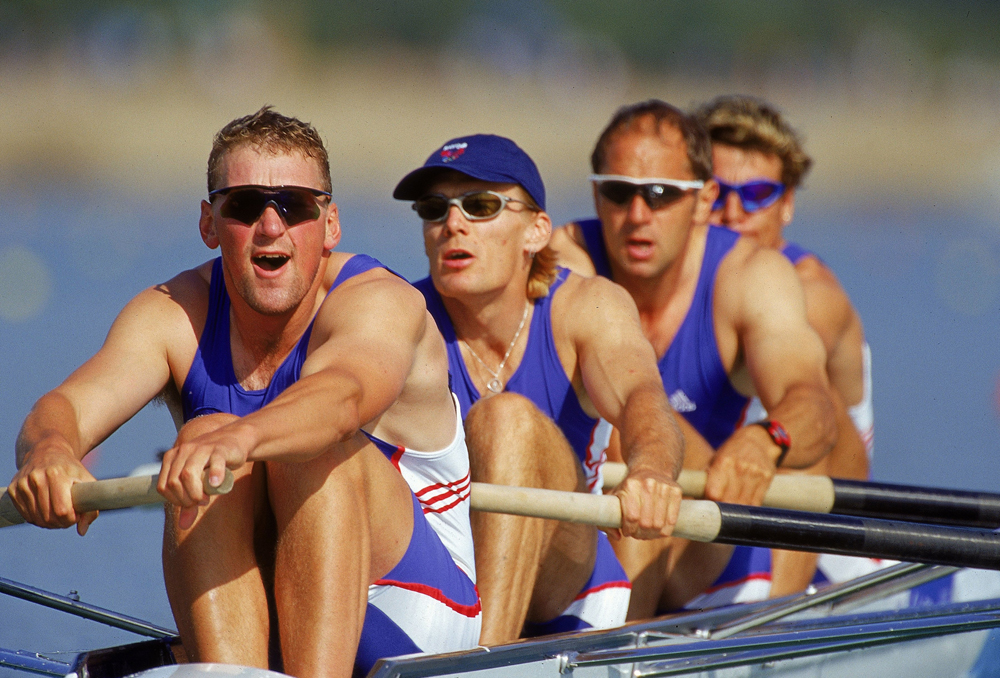Sir Matthew Pinsent is best known for being one of the most successful rowers of all time, winning four consecutive Olympic golds. He opens up about the pressure he felt to perform on one day and how he kept motivated.
Pinsent won his first Olympic gold in Barcelona in 1992 at the age of 21, with now 5-times Olympic champion, teammate and great friend Sir Steve Redgrave, who he reveals was a ‘huge influence’ throughout his rowing career.
Together they went on to win a further Olympic gold as a pair at Atlanta in ‘96 before moving to the coxless fours and winning again in Sydney 2000. After Redgrave retired, Pinsent went on to claim his final Olympic title in Athens.
We had to prepare mentally for the fact that there was one chance – we had to perform brilliantly on one day”
Despite the confidence gained from the first Olympic title, Pinsent reveals that the pressure became tougher as each Games went by. The expectation was huge as he had a track record behind him, and he had to maintain his motivation and focus on a winning mindset. “We had to prepare mentally for the fact that there was one chance – we had to perform brilliantly on that one day,” he says.
These days, Pinsent prefers to watch the sport from the side-lines. After Athens he decided to quit rowing and hang up his blades. He’s adamant that retirement was an easy decision and while he was sorry to see rowing go, he wanted to pursue other avenues in life.
How can you deliver high performance?
You’ve got to be passionate. My passion for sport gave me a huge leg up – I knew if I really committed, then I would do well. If you’re stuck doing something you don’t believe in, then it’s hard to find the motivation to deliver. And if motivation is a consistent problem, you might want to think about a change.
Ask yourself why your role makes you feel good when it goes well. What are the reasons you’re good at your job? Go back to your core principles to get you through the tough times.
Knowing setbacks will happen ahead of time is important”
Acknowledge that there will be low points. For us, this was usually around injury. You have to expect problems and know they are going to come. If you set out on a year-long project expecting it will be great the whole time, you’re deceiving yourself. Knowing setbacks will happen ahead of time is important.
What to do if your career slumps?
Give yourself time to think. Establish what your goals are. Try to work out what’s most important to you. Building everything on those foundations is much simpler than going for something and finding yourself in a career rut.
Decide what you want and build from there. Even if you’re not as successful as you were previously, you’ll be doing something you’re invested in.
What makes a high performing team?
You need great raw ingredients. Every person in the team must be both suited and committed to what they do. Once you have those people, there are three key elements to help that team work effectively: communication; trust; and effective feedback. There needs to be a balance between encouragement and honesty.
Steve [Redgrave] and I had a fantastic relationship. We could both be completely honest with each other – which would lead to some frank discussions at times – but we were both invested in the common goal, the speed of the boat.
Being in a successful team’s all about getting the best out of each other, motivating each other and living the ups and downs together – when it comes to the Olympics you have to trust one another that you’re going to deliver what’s expected.
How can teams adapt to change?
There has to be a lot of talking when there are changes in a team. If you’re bringing in a new person, they have to be totally invested right from the start. You can’t take things for granted and say ‘this is how we’ve always operated and you have to fit in with that.’ Don’t undermine the person coming in; make sure you explain what you’re doing and why, and ask for their feedback.
We changed our crew in the lead up to Athens and we spent a lot of time talking about why we were there and what it meant to us.
Commit each day to being a little better than the previous one, so that your output is as high as you can make it.
As a champion, how do you keep motivated?
Being at the top is an addictive feeling. If you’re successful in business or a winner in sport – the top is a great place to be. There are few people who get to the top and stop. Don’t be surprised if once you get there, you want more.
















